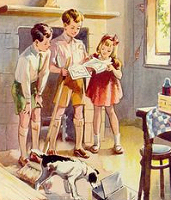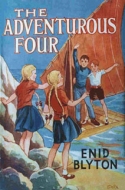
The Adventurous Four
Review by Laura Canning (April 27, 2007)
This is a cracker of a book, and one I remembered bits of for years after reading it as a kid. The 'four' aren't really 'adventurous' in the sense of the Famous Five et al – this is the first book about them and they don't think about adventures once, not even in the "Well, we certainly won't have an adventure in this quiet Welsh valley!" tradition of the Secret and Adventure series. The poor kids are only trying to have a holiday...
Two boys and two girls again – this time siblings Tom, who is twelve, and his ten year old twin sisters Jill and Mary team up with fourteen-year old local fisherboy Andy whom they meet while on holiday in Scotland. "There is a great island some hours away from here," Andy tells the children at the start of the book, "and my father has given me permission to take the fishing boat for the weekend to take you all there!" Hurrah!
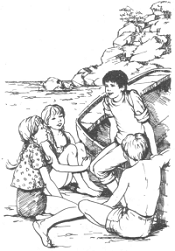
What happens next would be enough for an adventure book in itself. The storm duly comes and blows the fishing boat so off course that Andy thinks they must have passed Little Island. The only thing they can do, he says, is to make for some tiny deserted islands he knows are further ahead, on the Scottish coastline. They'll just anchor for the night and then look for them in the morning... but Andy has forgotten the anchor! His father warned him to take the old one as he himself was taking the boat's one to go fishing with his brother – and Andy has forgotten. D'oh! The boat will have to sail all night.
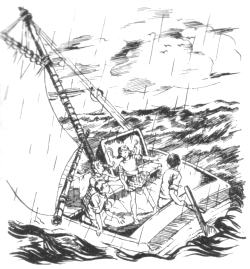
As luck would have it (sigh!), they are right beside the islands Andy was making for. They scramble out for the boat and half wade, half swim to shore.
The island they are on is not very hopeful – stony, bare and with only a few old deserted shacks to break up the landscape. Still, the children sensibly know they must make the best of it, and so they strip the boat of everything it contains before drying themselves off, lighting a fire, and yes, having a jolly good meal.
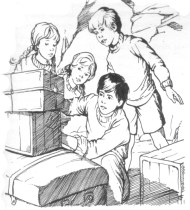
I thought at first that this was the only Blyton book I could remember mentioning politics of the day, until rereading The Valley of Adventure where references to a recent war in its Austrian setting must have referred to the same conflict. Unlike other children's writers of the time, for example Richmal Crompton whose Just William series contained a few dozen wartime stories, Enid Blyton's books normally exist in a kind of vacuum. Not this one, though. The children realise that this enemy base, consisting of the seaplane and several submarines, is how so many British ships have been sunk in nearby waters, and they know they must get back home as soon as possible to tell someone what they have seen. Tom, who brought his camera and several films to take bird pictures, takes photographs of the plane and the submarines, and the children think hard about how they can get off the island.
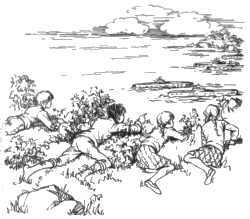
Even though Tom has been nothing but trouble so far, and that he eats all the food, Andy decides that only the boys will try and make for home in the raft they make by pulling down the shack. (This is a very clever move on the children's part – they wait for a storm, pull the shack down and pretend it has collapsed in the wind. Can they have a tent please, Mr German Soldier? And then they use their raft as the floor of their tent and put the tent up round it. Hee!)
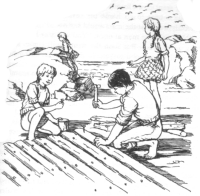
But it is a Blyton book, and of course all's well that ends well. The children are rescued, the Authorities are Informed, and the nasty baddies get their comeuppance. Rule Britannia!
But there are many aspects to this book that make it stand out from a normal "children as heroes in wartime" book. As with many of Blyton's one-off or short series books, the quality of writing is superior and there is a nice sense of realism despite the Boys Own plot. The ending, when the children hear the British bombs dropping on the German base, and Mary begins to cry, is quite a sombre moment as we realise that, unlike the "I would have got away with it if it wasn't for those pesky kids" villains-being-led-off-in-shackles ending, these baddies are actually being killed. Goosebumpy.
Andy is also a very good character, even if it is only against the three children who are quite poorly drawn. He has left school, and works as a fisherboy with his father, i.e., he is working class, but he isn't stereotyped the way characters like this often are in Blyton, and definitely takes the main role in the book. His knowledge of fishing and the outdoors makes all the Robinson-Crusoeing the children do plausible and uncontrived, much like Jack's character in The Secret Island. There are a few parts, such as when they pull down the shack to make a raft and then disguise it as the floor of their tent, which made me think that Ms Blyton was a Very Smart Woman Indeed.
Bad points – the characters of the other three children, especially Mary, are quite bland. Tom isn't too bad – it may be a cliché that he's always so jolly hungry, but at least we're given some colour about him – but the twins are mostly cardboard. Jill takes the initiative a few times and has some good ideas, as well as being quick to snap back at Tom if he gets too older-brotherly, and the girls are truly brave when left on their own, but Mary's character is there only as a foil. I don't think throughout the whole book she says anything spontaneous, and there are only about two instances where she says something rather than Jill in response to one of the boys. It's obvious Enid only put her in there to make up the numbers...
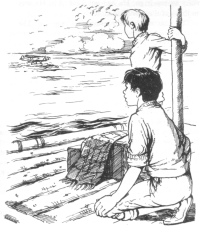
And one more whinge, although this isn't Enid Blyton's fault. On the Enid Blyton Society forums someone has mentioned that the book has been updated to make the twins Zoe and Pippa, and Andy go fishing after school instead of having left. So, er, if the book is now set in the present, why are there Nazis in it? Perhaps they are very old Nazis and they don't know the war is over? Perhaps the children went through a kind of time warp and the Nazis are in fact Daleks? Sigh again...
Still though. Minor gripes (except the last. Grr). This is a stonking great read – packed with adventure and danger – that stayed with me for years. Even my smug friend who giggles regularly at my Blyton geekiness said musingly a few weeks back, "What's that Enid Blyton book about the four kids who find Nazi submarines when they're on holiday?" Ha. Buy this one, it's well worth it. But buy it second hand!


